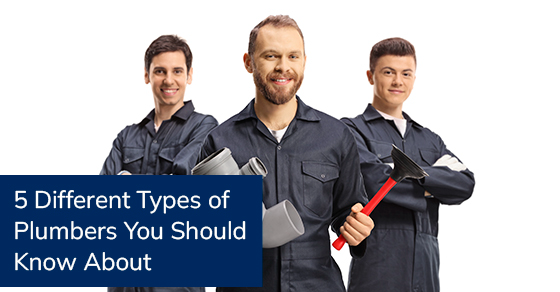5 Different Types of Plumbers You Should Know About

When you require plumbing work done on your home, you may need help knowing where to begin. There are many different types of plumbers, and each specialist is trained to handle a specific task.
This article will help you understand five different types of plumbers and how each can help you with a particular job, building stage, or project scale. As you read this article, consider your plumbing needs and which type of plumber best suits your requirements.
1. Residential Plumber
A residential plumber specializes in installation, maintenance, and repair in homes. Residential plumbers are the type of plumbers you are familiar with who come to your home to help with kitchen, bathroom, and drainage work needing to be done.
Residential plumbers can have versatile skill sets. They can do installs like connecting sinks, showers, toilets, and water heaters while setting up water supply and drainage. A residential plumber in Mississauga can also do maintenance, including finding and fixing leaks, blockages, and areas needing repair.
They can also do routine and preventative maintenance to ensure your home’s plumbing system works for years to come.
When experiencing a plumbing emergency such as burst pipes and flooding, you’ll want a residential plumber to rush over and stop the crisis. If this happens, you must act as quickly as possible to mitigate further damage to your home.
A residential plumber will also be able to ensure that all the work done to your plumbing system is done in compliance with your local building codes and regulations. Because they are an expert in all matters concerning your home’s plumbing, they are an excellent resource for solid information and recommendations.
This consultation lets you understand what is happening and meet your customer service needs.
2. Commercial Plumber
A commercial plumber typically handles large-scale installations and complex plumbing setups. These specialists often install intricate plumbing systems for commercial buildings such as hotels, factories, and offices.
A commercial plumber will use more specialized equipment to accomplish these large-scale tasks. They will be considering issues on a larger scale than a residential plumber. They will consider commercial water conservation efforts, hydronic systems, fire suppression systems, and commercial-level waste and drainage systems.
Since commercial buildings are subject to different codes than homes, a commercial plumber needs to know the specific building codes to which they must comply.
3. Water Supply Plumber
Water supply plumbers are typically a specialized subset of residential plumbers. They focus on integrating a home’s (or commercial building’s) water system with water supply lines. They can install piping and sanitation systems for kitchens, bathrooms, laundry rooms, etc.
A water supply plumber will also be considering questions about the water quality entering the system, such as assessing sediment in the water or preventing the contamination of potable water.
4. Sanitary Plumber
A sanitary plumber will diagnose and repair plumbing systems that are related to sanitation. For example, they will install drainage systems, place sewer lines, install septic systems, and manage the design and installation of wastewater management systems, including grey water.
Someone trained as a sanitary plumber would be the person you want to fit new water heater systems, showers, and toilets. Aside from the safety aspect, one of the most important jobs of a sanitary plumber is their ability to control and mitigate odours that can emanate from sanitary systems.
Of course, a sanitary plumber will know about all required code compliance to ensure you are safe.
5. Construction Plumber
Construction plumbers typically work on new buildings being built. They will look at the blueprints and design effective and safe plumbing systems to meet the architectural desires of their employer. They will typically plan the design and layout of entire plumbing systems within a new construction.
They will work closely with other construction professionals on the same job site, such as engineers and electricians, to ensure the project is executed to the highest degree possible.
Since they are working on buildings that are still being built, they typically install pipes and connections before finishing walls, floors, and ceilings. As well, because they are designing and creating the entire plumbing system, they will test and analyze the system to ensure that there are no leaks and that the system is structurally sound.
A construction plumber can also do inspections, repairs, and corrections. Depending on what you need, a construction plumber can be part of every building process step, from initial system design to finalizing the last connections.
Hiring The Right Plumber
As you can see, there are many different specializations of plumbers. For whatever work you need to be done, it’s essential to hire a trustworthy professional trained to do the work you need to do.
You want to hire the right person for the right job. Hopefully, after reading this article, you will be more aware of what options you have available to you.
When selecting a plumber in Toronto, consider finding one that meets the following requirements:
- A plumber who is skilled and experienced in solving your particular problem.
- A plumber who provides clear communication and solid customer service (you want to know what is happening every step of the way).
At Brothers Plumbing, we are committed to providing excellent service from our trained technicians. We stand behind the work that we do and let the quality of our work speak for itself. We understand that knowing where to start regarding your plumbing can be challenging. We would be happy to answer any questions that you may have.
For more information about our plumbing services, call Brothers Plumbing at 800-741-8471 or learn more and contact us here.
Posted By Brothers Plumbing
0 Comment
